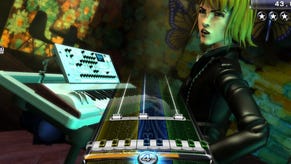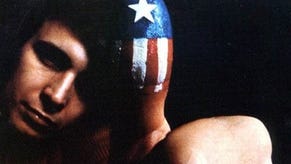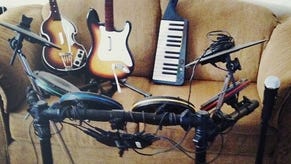Rock Band 3
MIDI life crisis.
You'll need one to use the astonishing Fender Squire Stratocaster for Rock Band, due in early 2011 (price TBC). This handsome instrument is a normal-looking and fully-functioning electric guitar with invisible sensors in the fret board and pickups that track your fingering and allow it to be used as a MIDI instrument or Rock Band controller.
Early (or less rich) Pro guitarists will need Mad Catz's Fender Mustang Pro guitar (£125), a somewhat bizarre hybrid of controller, MIDI instrument and real guitar. The 102 buttons down the neck correspond to every possible string/fret fingering, while the strum switch is replaced by a "string box" with six nylon-coated, stainless-steel strings for picking and strumming. It's heavier, with a superior finish, than a standard Rock Band guitar.
The frets are numbered, with the numbers appearing above the appropriate strings in the on-screen readout to show you where to finger and what to pluck. Since this is a reversal of the normal Rock Band display – the channels now showing you what to do with your right hand rather than your left – it's absolutely head-scrambling at first, especially when you need to ensure both hands are on the right "string" and translate a number to a hand position at the same time.
Nonetheless, this complete guitar novice was able to go from hopeless confusion to hitting every note on a Pro Easy bass part in the course of one song. I had a few piano lessons as a boy, so the Pro keyboard ought to have been easier to master, but even seasoned musicians will take a while to adjust to the speed and idiosyncratic notation of the screen readouts – which, given Rock Band 3 can now accommodate seven musicians (drums, keyboard, guitar, bass and three vocalists), are rather cramped.
At this point you start to worry that Rock Band 3, with its 2000 songs, seven players, five instruments, two modes, multiple difficulties and new-found educational manifesto, could get very unwieldy to use and lose sight of its roots as a party game. It all sounds a bit fussy and hobbyist. That's why the structural and interface improvements are perhaps the most quietly impressive part of this huge undertaking.
Most crucial is the "overshell" interface, which gives every player (except backing singers) their own small pop-up menu which can be used at any time and independently of the others to change settings and pick options, eliminating what Harmonix calls the traditional "tug of war" for control.
In order to deal with the ballooning song library, there's a song filter that lets you search by a wide range of criteria: genre, decade, length, difficulty, family-friendliness, rating, whether it has a keyboard part and so on.
You can compile your own set lists – on the console or at the game's website – and send them to yourself or your friends, with challenges attached. Or you can set up a filter and hit Party Shuffle, which makes a cycling random playlist from the selected tracks. No Fail mode is always instantly accessible.
Rather than offering a single, linear career mode to play through, Rock Band 3 has a sort of persistent meta-career in which you "level up" by collecting fans for completing a huge range of goals and challenges.
The Road Challenges are like shorter versions of the old Rock Band career. They're "beat Rock Band in a night" party experiences themed around venues, songs and archetypal rock stories, and linked by cute cinematic vignettes starring your own bands and avatars (made with the vastly improved character customisation system). They might last an hour, or four.
The meat of the long-term game will be in choosing your own Goals (Rock Band 3's own achievement system) to pursue, however. These might be structured campaigns leading you through each instrument, say, and the game will automatically construct set lists for you based on what you haven't achieved yet.
That's the remarkable thing about Rock Band 3. There are so many ways to play it, but it seems so comprehensive and flexible that it can always and instantly shape itself to your needs: whether that's to embark on a long, solo journey of instrument mastery, blast through a narrative rock fantasy with friends or simply party like it's 1990-1999.
As hour-long game presentations go this was a head-spinning one, and although the Harmonix rep is too modest to say it, Rock Band 3 looks like the ultimate music game. Can it live up to that promise? We'll just have to wait and see... but I know what I'm betting on.
Rock Band 3 is released on October 29th for PS3 and Xbox 360. A Wii version will also be available.

















